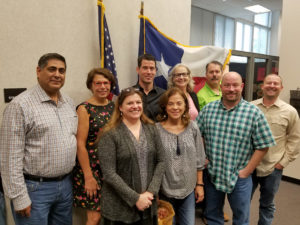I walked out of a Texas prison on December 15, 2015. My actions that took me to prison cost me everything; my family and my livelihood. Upon release, I had nowhere to go except to a transitional house in Austin, Texas. A 2×2 red bag now contained everything I owned.
In prison every decision is made for you. What you wear, where you sleep, what you eat, even what you do for a work assignment. Upon release, I found myself at the Austin Greyhound bus station with my 2×2 red bag and no idea how I would find my way to report to the parole office. The kindness of a stranger got me on a city bus and the kindness of the bus driver got me to the parole office on time. At this point I’m scared and I have no idea where or if I have a transitional home to go to or what to do next. When I arrived at the parole office, my name and placement was on file and Margie Pena from Texas Reach-Out Ministries appeared before me; an angel who opened her arms wide and took me to my new home (where I still reside). The next few days were spent traveling all over Austin getting my social security card, a state ID card, medical card, bus passes, and food stamps; all needed just so I could obtain the basics to move on.
Re-entry is hard enough if you have support; it seems insurmountable when you are alone and in a new city. Complicating matters even more, I was released at the end of the year, when programs are ending, funding has dried up, and agencies await new funding.
The quest for employment, transportation, food, and housing brought me to Goodwill Central Texas. Goodwill provided a means to start again, by providing intake services, testing, and classes. Through Goodwill Staffing Group, a temporary placement agency, I was placed in a temporary assignment at the Texas Department of Housing and Community Affairs (TDHCA).
That temporary two-week assignment kept being renewed. Eventually Michael De Young, the Director of the Community Affairs Division, asked me the hard question, “Can you tell me why, exactly, you don’t work for me?” It wasn’t an easy question to answer. I had assumed that I was ineligible to even apply for a job with the state due to my incarceration. I applied for an open position. I made it through the interview process and was offered the position of Program Specialist in the Community Affairs division where I had been “The Temp” for six months.
Various agencies and programs in Austin and Travis County provided bus passes and back rent to help me get on my feet. These turned out to be the agencies for which I now serve in my new position at TDHCA. Sometimes even people who are trying to be strong need a hand-up. Each of my fellow employees knows my personal story; occasionally, each has had to ask me questions on issues of re-entry and how we at TDHCA can help those formerly incarcerated.

In Texas, 70,000 people will leave prison every year and here is how some of the Texas Community Action Agencies are helping:
City of Fort Worth (CFW) CAP is working with First Stop Center and The Redemption Bridge, two agencies working with formerly incarcerated and their family members as they transition back into society. Once identified, the client completes an application and a self-assessment. Caseworkers from CFW CAP and the referring agency both work toward ensuring the client identifies their strengths, considers their barriers, and then assists in guiding the client toward completion of their goals. CFW CAP has identified employers that will work with formerly incarcerated, so that the frustration level for these clients is minimized. This population is harder to place, but it is crucial to their reintegration into society.
City of Austin has an outreach program in collaboration with the Travis County Correctional Complex and the Travis County State Jail. They provide resources/information about their services to male and female inmates. They usually have 190-220 participants per quarter from both facilities.
They also collaborate with Travis County Justice Planning Workforce Development Taskforce (post-release) where the staff has the opportunity to attend the Re-Entry Employment Specialist training provided by the Travis County Offender Workforce Development Team. The Re-entry Employment Specialist training was developed by the National Institute for Corrections to assist community members and professionals to provide job readiness, placement, and retention services to individuals with a prior criminal history. Participants receive intensive competency-based instruction that includes approximately 24 hours of classroom training. The classroom training is delivered in three sessions, approximately 8 hours per day on a quarterly basis. Participants must complete all three days of training to become certified.
Sometimes out of the worst moments in our lives, we find ourselves in a position to make a difference for others who find themselves in a similar position. The programs that TDHCA administers gave me a hand-up when I needed it most. Now, I am employed by TDHCA and helping to develop materials, advocate, and change lives for other human beings who have been given a second chance and are in need of a little kindness.
This Guest Blog was written by Karen Keith, Program Specialist, Texas Department of Housing & Community Affairs.





